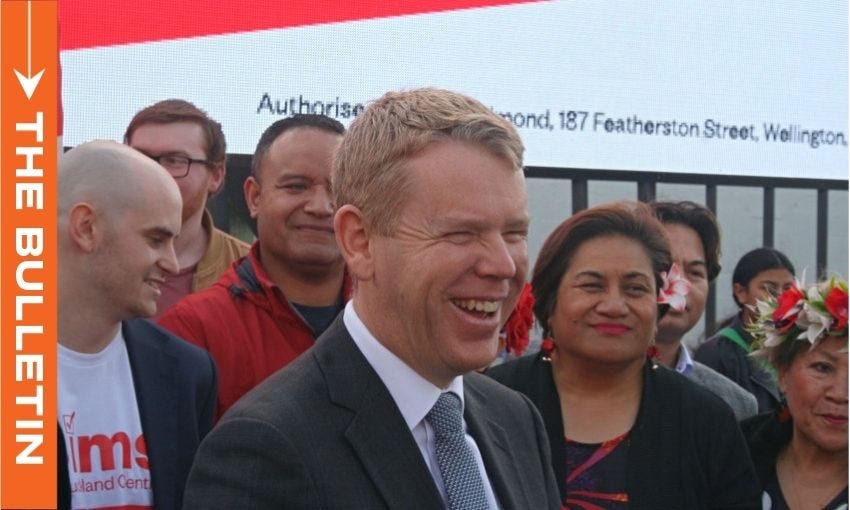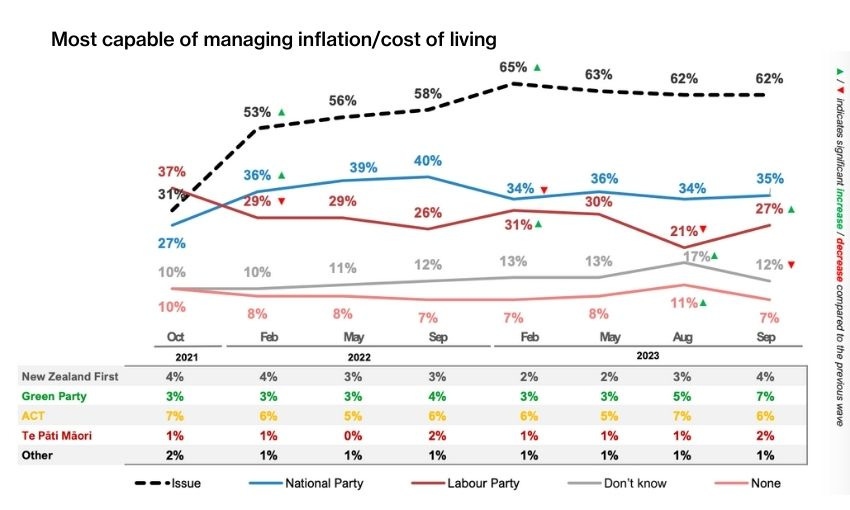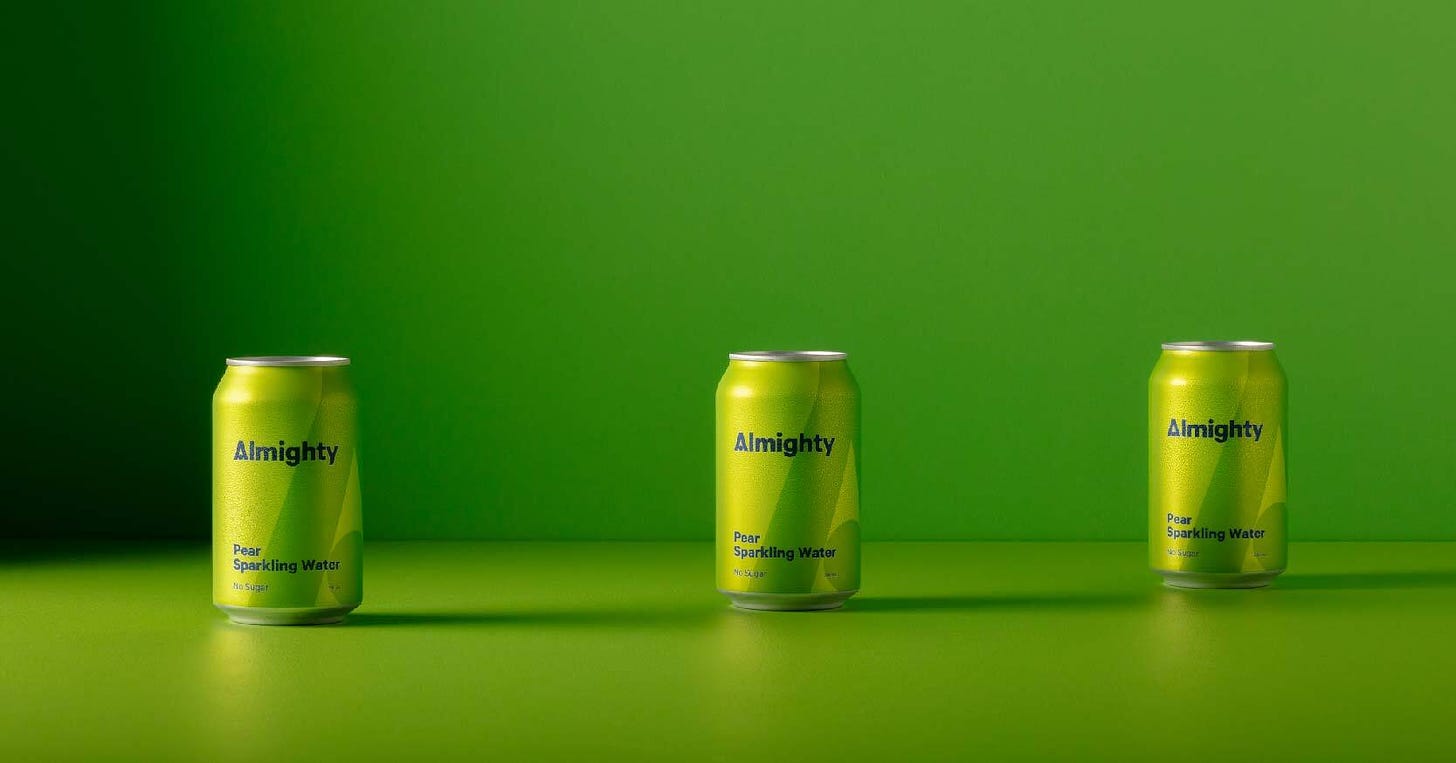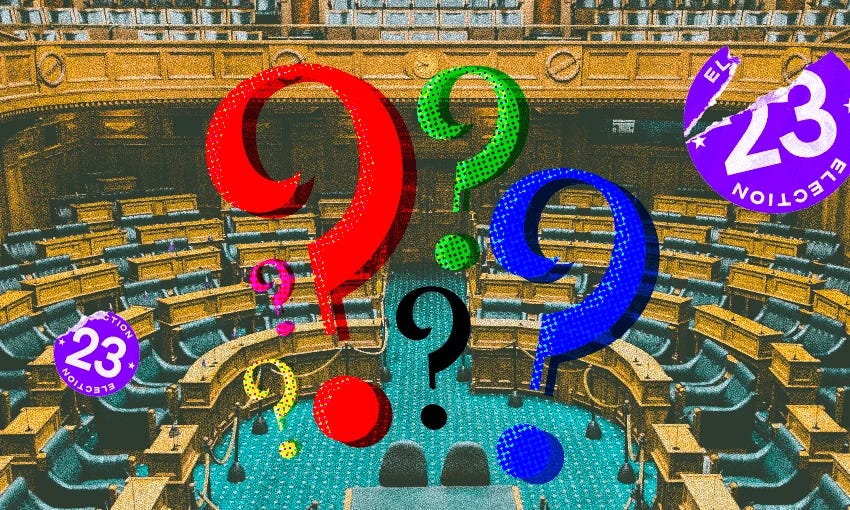Poll gives Labour a bump as pre-nuptial machinations continue on the right
A new Guardian poll delivers a lift for Labour and for the first time, a reversal in the right block's hierarchy of power as Act’s support falls
Mōrena, and welcome to The Bulletin for Wednesday, October 11 by Anna Rawhiti-Connell. Presented in partnership with Z Energy.
In today’s edition: Christchurch Men’s Prison reaches capacity; Otago University looks to curb “hazing” incidents; Port Waikato byelection confirmed for November; but first, a new poll once again confirms National’s reality
Poll bump for Labour
This morning’s Guardian Essential poll brings some good news for Labour in that it’s up from 26.9% in September to 30.3%. The Green party are on 10.6%, down slightly from 11% and Te Pāti Māori is on 1.9%, down from 2.5%. That would see a Labour/Greens/TPM coalition holding 55 seats (up two from September) and the right 54 (down five). “While most analysts and all major polls have suggested voters will abandon the Labour-led government in Saturday’s vote – consistent with a depleted national mood fuelled by high inflation and a cost-of-living crisis – National has not capitalised on the dissatisfaction,” writes Charlotte Graham-McLay.
National still considered most capable of managing key issues
Labour has also gained some ground in the Ipsos Issues Monitor survey released yesterday. National are still well ahead when it comes to which party is most capable of dealing with the top five concerns of New Zealanders but Labour has gained six points from where it was in May on the number one issue of cost of living. The government’s performance rating slightly increased from August 2023’s record-low mean score of 4.5 to 4.7. Concerns about fuel prices have shot up since May.
First poll to show NZ First ahead of Act
My husband helpfully offered a headline suggestion for last week’s Bulletin about Sir John Key’s guest appearance in this year’s campaign nine hours after I’d sent it. Naturally, it was a riff on Key’s three-way handshake at the 2011 Rugby World Cup. Despite the Guardian poll bump for Labour, a three-way handshake between National, Act and NZ First still looks like the most likely path to forming a government after the election. This morning’s poll is also the first to show what Toby Manhire called Act’s “nightmare scenario”, with NZ First on 8.2%, up from 6% on September’s poll while Act has fallen from 10.3% to 7.9%. National is down 0.5% on 34%. We’ll wait and see what tonight’s 1News Verian poll tonight brings.
Act and NZ First play slightly nicer
As Andrea Vance writes for The Post, there was still “theatre and a few sparks” between David Seymour and Winston Peters at last night’s Press debate in Christchurch, but “both reined in their previous enmity”. The Herald’s Derek Cheng (paywalled) and interest.co.nz’s Dan Brunskill have examined the alignment between National, Act and NZ First. Cheng writes that “if you remove all the noise, Christopher Luxon, Seymour and Peters would be more likely than not to find enough common ground to cobble together a government”, while Brunskill highlights the likely sticking points. There’s an interesting snippet from Luxon’s “job interview” on the Herald this morning, with Luxon dodging a question about whether he knew that campaign chair Chris Bishop was going to publicly float the prospect of a second election if talks with NZ First fell over. With Seymour and Peters keen to downplay the notion of a second election at last night’s debate, it does seem as if they have moved into an acceptance phase, albeit with one happier about the prospect than the other. National may need to cycle through past denial and meet them there.
Try the pear-fect new drop from Almighty
With the gentle taste of Williams pears, the new Almighty pear flavoured sparkling water is quickly becoming a favourite. Multi-packs are available online or at your favourite grocery store, to be enjoyed on their own or over a cheese board. Shop the new flavour now, and feel Almighty good (sponsored)
Christchurch Men’s Prison reaches capacity
As Stuff’s Blair Ensor reports, one of the country’s largest jails, Christchurch Men’s Prison, reached capacity at the weekend - resulting in a prisoner being held in police cells and others being transferred to another facility in Otago. Officials have been involved in “emergency planning” to resolve what’s been described as a “complex situation”. Corrections says it has enough beds for prisoners but is managing ongoing staffing issues. Those staffing issues are well documented. So too, is the impact on those in prison. Canterbury Criminal Bar Association president Nicola Hansen says transferring men to Otago Corrections Facility was “causing significant issues for defence counsel and defendants, undermining fair trial rights, and adding to the delays affecting our under-resourced justice system”.
University steps in and warns of expulsions
The University of Otago has stepped in to stop flat initiations and “hazings”, warning students that there was “genuine concern that one of these events will result in serious harm or death” and that carrying on with them could result in expulsion. As RNZ reports, a group of students had recently planned to hold an initiation for new flatmates involving drinking and eating sardines but were visited by Campus Watch the night before and given a letter warning they could be expelled from the university. It follows reports by Critic and the Otago Daily Times of some pretty horrifying and cruel “rituals” involving biting legs off ducks' and holding live eel in flat hazing rituals.
Click and Collect
The next phase of KiwiRail’s three-year-long rebuild of large parts of Auckland’s rail network begins at Labour weekend, with work starting on the Western line
Makes me itchy just typing this, but there’s growing concern about bed bugs hopping the channel from Paris to England after a video shared online appeared to show a bedbug on a passenger’s leg on the Victoria line
Click and Elect
Port Waikato byelection confirmed for November
By virtue of my age, some things feel like ingrained political lore to me. The canon of Winston Peters is a good example. Shanti Mathias tackled a Winston Peters glossary as a member of Gen Z. It’s great and a reminder of the value of fresh eyes.
The small business policies in two minutes
The transport policies in two minutes
Toby Manhire gets out his abacus to work out what parliament will look like if numbers, as they appear today, play out on election day. Stewart Sowman-Lund visits Rangitikei, a National stronghold with an Act-shaped complication. Rachel Judkins uncovers the harsh reality behind lockdown dog adoptions. D.V. Bishop explains how his award-winning crime novel was dreamed up against the backdrop of Florence, libraries and the Covid years. Tara Ward takes a look at an American streaming service offering wall-to-wall reality series that’s just launched in New Zealand. A mother of two with a full-time job and a side hustle explains how she makes the sums work for the latest instalment of our Cost of Being series.
Sporting snippets
Australia confident in hosting next Commonwealth Games, but it’s unlikely to be in 2026
The race to clean up the Seine, a river that has not allowed public swimming for a century, in time for the Paris Olympics in 2024
Got some feedback about The Bulletin, or anything in the news? Get in touch with me at thebulletin@thespinoff.co.nz.
If you liked what you read today, share The Bulletin with friends, family and colleagues.















CEO's make rubbish prime ministers because:
1. such economics knowledge as they do have, is entirely focussed on Micro, whereas a nations finances are also a Macro subject. Extrapolation of concept from Micro to Macro simply doesn't work, because it ignores the economic effects of the capacity of both the RB and the retail banks to create and destroy money.
2. A large part of the CEO's skillset is to know how to sail close to the limits of the law without crossing over into illegality. Naturally a CEO turned PM will use their new-found power to remove those limits regardless of the consequences. They just transfer their adversarial mindset from advantage over competitors to advantage over the population-at-large.
3. CEO's work to the briefing of 'the board' of their company. In politics, Parliament is 'the board', but the CEO looks down on Parliament as, at best, subservient executives. The 'board' from which the CEO PM will take his briefing will be a 'think-tank' such as NZI, which the CEO will respect as a committee of his 'peers'.
Good